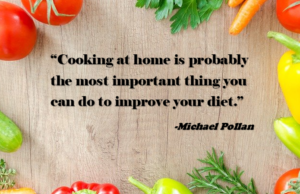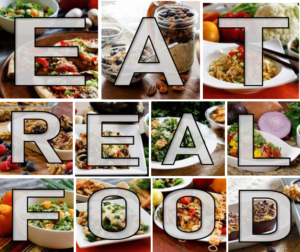 Did that headline grab your attention?
Did that headline grab your attention?
It definitely got ours!
Then, as we read the rest of the article, two things struck us:
1. Cooking at home does NOT increase the risk of heart disease, diabetes and metabolic syndrome (as the article suggests).
2. We have to be cautious when reading the health and nutrition related headlines we are bombarded with online and in magazines!
The "cooking at home" article talked about a study conducted by researchers at Rush University in Chicago. The conclusion was the more time middle-aged women (like us!) spent cooking at home, the higher their risk of metabolic disease. The study also observed that females who spent less time cooking were less likely to suffer health problems.
REALLY?!
Digging deeper, the researchers analyzed data from a study that included 14 years of data for more than 2,500 middle-aged women. The women had a yearly health exam and answered questions about their habits. The researchers observed that the rate of metabolic disease increased for those who spent more time preparing meals at home. Even though there were no observations about WHAT the women were preparing at home, that was enough for a flurry of headlines about why cooking at home may not be so healthy.
Again, we say...REALLY?!
 Of course, this type of headline is intended to attract readers, even though it is VERY misleading. Drawing a conclusion that cooking at home causes metabolic disease is clearly taking things out of context -- and it's ridiculous!
Of course, this type of headline is intended to attract readers, even though it is VERY misleading. Drawing a conclusion that cooking at home causes metabolic disease is clearly taking things out of context -- and it's ridiculous!
It's obviously not the act of cooking that affects someone's risk of metabolic disease, but WHAT they are cooking! Sure, if someone spends a lot of time cooking brownies, cookies, fried foods and meals using highly processed foods, they will have a higher risk of diabetes, heart disease and other illnesses.
On the other hand, we GUARANTEE that someone who spends time cooking meals using REAL ingredients will have better health and a significantly lower risk of developing these diseases!
A better headline would be "Cooking Healthfully, Not Just Frequently, is Key to Lower Rates of Metabolic Disease." But that headline wouldn't be as captivating to readers, now would it?!
"Slim by Chocolate"
This resulted from a journalist who created an intentionally meaningless study that included only 16 participants (actually 15 because one dropped out). They randomly assigned the participants to one of three diet groups (one group ate a low-carb diet, another group added a daily 1.5 oz. bar of chocolate to their low-carb diet, and the third group made no changes to their diet). To make a long story short, they tracked many variables so they would have at least one that would allow them show a health benefit they could associate with eating chocolate every day. Of course, the factors were entirely random the way they conducted the study.
They got their "scientific paper" published in a journal (with no peer review), and then issued a press release to share their findings with the world. The headlines spread like wildfire and showed up as front-page news -- "Lose Weight by Eating Chocolate Every Day," "Scientists Say Eating Chocolate Can Help You Lose Weight," and "Why You Must Eat Chocolate Daily"...just to name a few!
Of course, there were no details about how the study was conducted or what other factors might have contributed to the results. It was all about the headlines!
No wonder so many people are confused about how to eat!
Studies can be designed to show that "soy causes cancer" or "soy helps prevent cancer." Or, they could be designed to show that "artificial sweeteners contribute to weight loss" or "artificial sweeteners contribute to weight gain." These studies are then used to produce headlines that sound very convincing, but also create all kinds of confusion. And, in most cases, there is a company or organization with their own motives seeking to profit from our confusion.
Here are some other misleading headlines that you may have seen in your inbox or news feeds:
"Citrus Fruits May Increase the Risk of Melanoma" REALLY?! (Do citrus fruits really increase your melanoma risk? Perhaps people who live in areas where these fruits are most prevalent...like California and Florida...tend to be more exposed to the sun's damaging rays and are at higher risk.)
 "Scientists Prove Drinking Wine is Better Than Going to the Gym" We really love this one, but REALLY?! (Maybe many of you saw this one! Sorry to be the bearer of bad news, but a daily glass of wine is not a substitute for exercise. The good news is a glass of wine can provide health benefits...just make sure it's AFTER your daily exercise!)
"Scientists Prove Drinking Wine is Better Than Going to the Gym" We really love this one, but REALLY?! (Maybe many of you saw this one! Sorry to be the bearer of bad news, but a daily glass of wine is not a substitute for exercise. The good news is a glass of wine can provide health benefits...just make sure it's AFTER your daily exercise!)
"Eating Cheese and Butter Every Day Linked to Living Longer" REALLY?! (So, let's get this straight...so far, the headlines we have looked at say we should cook less, minimize citrus fruits and enjoy cheese, chocolate and wine every day? Definitely not the best approach!)
"Scientists Say Smelling Farts Prevents Cancer" REALLY?! (Yes, this is a real headline! But, rest assured, you don't need to say "thank you" the next time a family member lets out a smelly one in the car...and yes, you should still roll your windows down for fresh air!)
"An Avocado a Day Keeps Leukemia Away" REALLY?! (While there is a compound found in the seed of an avocado that has shown some promise in laboratory experiments, this headline is clearly misleading.)
"Caffeine Cures Alzheimer's!" REALLY?! (If only it were that easy...)
So, the next time you see a headline that sounds too good to be true, it probably is!
Our advice...
forget the headlines...
just keep it simple and EAT REAL!



Every time I’m in the grocery store line I read these headlines and it makes me sad that so many people are misled. I’m not the one to talk about great cooking habits but I do try. We don’t fry anything, eat veggies at every meal, fruit at every meal and try to limit the carbs. We do loose ourselves to desserts sometimes, but not to access. It’s hard to believe that this diet would cause me to have more of a health risk. I guess time will tell.
Thank you for the feedback Deb! We are extremely proud of your successes — I think you have found the secret to a long and healthy life!
I agree: ‘just keep it simple and eat real!’ It’s sure working for us!
You are absolutely correct — you both are an amazing and inspiring success story! Thank you!